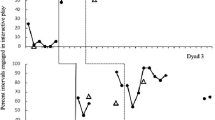Abstract
This study describes the lived experience of Kevin, a young child with physical disabilities who is placed in an inclusive classroom, a classroom where children with and without disabilities are educated together, with extra support provided for the child with disabilities. Children with disabilities who are placed in inclusive early childhood settings tend to be rejected or neglected more than their typically developing peers and are involved more with the adults in the classroom than with their peers. Kevin’s experiences are framed in the context of the current emphasis on inclusive practices. The study documents that adult assistance and curriculum activities both play an important role in either facilitating or constraining social interaction with peers. When the assigned assistant functions as the child’s playmate and mostly chooses table activities, both of these seem to limit opportunities for social interaction with peers. This study also documents that, without the assistant present, the child makes independent choices such as where and with whom to play. The dramatic play area serves as a conduit for meaningful verbal and nonverbal communication with peers. At the same time, Kevin’s strong desire to play in this area seems to be the impetus for physical development—he walks alone for the very first time. Suggestions are given for teacher facilitation of dramatic play.
Similar content being viewed by others
References
Bennett, M., (Ed.) (1993). The development of social cognition: The child as psychologist. New York: The Guilford Press
Bodrova E., Leong D. J., (1996). Tools of the mind. The Vygotskian approach to early childhood education. Englewood Cliffs, NJ: Merrill Prentice Hall
Bretherton I., (1991). Intentional communication and the development of an understanding of mind. In Frye D.,Moore C., (Eds), Children’s theories of mind: Mental states and social understanding (pp. 49−75). Hillsdale, NJ: Erlbaum.
Brown W., Odom S. L., Holcombe A., (1996). Observational assessment of young children’s social behaviors with peers Early Childhood Research Quarterly, 11:19–40
Corsaro W. A., (1997). The sociology of childhood, Thousand Oaks, CA: Pine Forge Press
Fernie D. E., Kantor R., Whaley K. L., (1995). Learning from classroom ethnographies: Same places, different times. In J. A. Hatch (Eds.), Qualitative research in early childhood settings (155−179). Westport, CT: Praeger.
Fromberg D. P., (1992). A review of research on play. In Seefeldt C., (Eds.), The early childhood curriculum: A review of current research (2nd ed.,). New York: Teachers College Press. 42–84
Goncu A., (1993). Development of intersubjectivity in the dyadic play of preschoolers Early Childhood Research Quarterly, 8(1):99–116
Horn E., Lieber J., Sandall S. R., Schwartz I. S., Wolery R. A., (2002). Classroom models of instruction. In Odom S., (Eds.), Widening the circle: Including children with disabilities in preschool programs (46-60). New York: Teachers College Press
Hudson J. A., (1993). Understanding events: The development of script knowledge. In Bennett M., (Ed.), The development of social cognition: The child as psychologist. New York The Guilford Press 142–167
Kemple K. M., (2004). Let’s be friends: Peer competence and social inclusion in early childhood programs New York Teachers College Press
Kemple K. M., Duncan T. K., Strangis D., (2002). Supporting young children’s peer competence in an era of inclusion Childhood Education 79(1):40–47
Kontos S., Burchinal M., Howes C., Wisseh S., Galinsky E., (2002). An eco-behavioral approach to examining the contextual effects of early childhood classrooms Early Childhood Research Quarterly 17:239–258
Kontos S., Wilcox-Herzog A., (1997). Influences on children’s competence in early childhood classrooms Early Childhood Research Quarterly 12:247–262
Kostelnik M. J., Onaga E., Rohde B., Whiren A., (2002). Children with special needs: Lessons for early childhood professionals New York Teachers College Press
Light P. Developing psychologies (1993). In Bennett M. (Ed.), The development of social cognition: The child as psychologist. New York: The Guilford Press. 191–200
Odom, S. L., Brown, W. H., Schwartz, I. S., Zercher, C., & Sandall S. R. (2002). Classroom ecology and child participation. In S. Odom (Ed.), Widening the circle: Including children with disabilities in preschool programs (pp. 25–45). New York: Teachers College Press
Petrakos H., Howe N.,. (1996). The influence of the physical design of the dramatic play center on children’s play Early Childhood Research Quarterly, 11:63–77
Rizzo, T. A. (1992). The role of conflict in children’s friendship development. In W. A. Corsaro & P. J. Miller (Eds.), Interpretive approaches to children’s socialization. New directions for child development (Vol. 58, pp. 93–111)
Smetana S., (1993). Understanding of social rules. In Bennett M., (Ed.), The development of social cognition: The child as psychologist New York The Guilford Press. 111–141
VanHoorn J., Nourot P. M., Scales B., Alward K. R., (2003) Play at the center of the curriculum. 3rd Ed. Merrill Prentice Hall Upper Saddle River, NJ
Vygotsky L. S. (1978). Cole M., et al. (Eds.), Mind in society: The development of higher psychological processes MA: Harvard University Cambridge
Wise L., Glass C., (2000). Working with Hannah, a special girl in a mainstream schoolNew York RoutledgeFarmer
Author information
Authors and Affiliations
Corresponding author
Rights and permissions
About this article
Cite this article
Kim, S.d. Kevin: “I Gotta Get to the Market”: The Development of Peer Relationships in Inclusive Early Childhood Settings. Early Childhood Educ J 33, 163–169 (2005). https://doi.org/10.1007/s10643-005-0041-3
Published:
Issue Date:
DOI: https://doi.org/10.1007/s10643-005-0041-3




